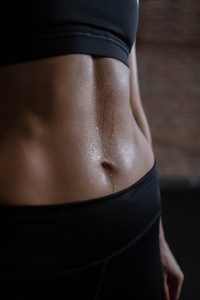 Sweat is good. That’s one of our mottos at RC Fitness Houston, TX. When you sweat, it means you’re working hard and doing what it takes to get into shape. When your body is getting overheated, particularly if you’re in a tough workout, sweat comes to the rescue to cool it through evaporation. While people who sweat a lot may have an odor, it doesn’t come from the actual sweat. The odor comes when it mixes with the bacteria on the skin, clogged pores and dirt.
Sweat is good. That’s one of our mottos at RC Fitness Houston, TX. When you sweat, it means you’re working hard and doing what it takes to get into shape. When your body is getting overheated, particularly if you’re in a tough workout, sweat comes to the rescue to cool it through evaporation. While people who sweat a lot may have an odor, it doesn’t come from the actual sweat. The odor comes when it mixes with the bacteria on the skin, clogged pores and dirt.
There are two to four million sweat glands in the body.
You have two types of sweat glands. Eccrine sweat glands are located on your palms, the soles of your feet, your forehead and armpits. The apocrine glands are larger and located in areas with more hair, such as armpits, groin and the breast area. The sweat from those glands is smellier. There’s more hair in those locations. The more hair there is in the area, the more potential for bacteria that can produce a more potent smell. There are also two types of sweat. The first is regular sweat to cool down, which is primarily water and salt, and the second is stress sweat which is thicker and evaporates more slowly, giving it time to combine with bacteria and produce odor.
Some people smell worse than others do.
Genetics plays a role in whether your sweat smells bad, so does your gender. How dirty you are, what you ate and your overall health, also affect the smell of your sweat. The sweat from apocrine glands starts out odorless, but when it hits the surface and mixes with the bacteria on the skin, the bacteria breaks down the sweat to produce an odor. People with diabetes, an overactive thyroid, kidney or liver dysfunction or genetic disorders may have a uniquely smellier sweat.
You can learn a lot about your body if you investigate your sweat.
If your sweat is far smellier, maybe you have clogged pores, need a shower or exfoliation. Profuse sweating can be an indication of hyperhidrosis, a medical condition causing a person to sweat as much as four times more than the average person. It’s embarrassing, but not normally dangerous. Hypohidrosis, also called anhidrosis, is characterized by too little sweat. That can be dangerous and come from conditions that are also dangerous, such as a metabolic disorder, connective tissue disorder, diabetic neuropathy, a central nervous disorder, such as a stroke or Parkinson’s or dehydration.
- A cold sweat leaving you feeling clammy may be caused by low blood sugar, low blood pressure or other serious condition such as heat exhaustion, a heart attack or a serious allergic reaction.
- If you suddenly start to sweat, even though you’re not anxious or too warm, and have a sudden increase in your heart rate, it may be an early indication of a heart attack.
- If your sweat is smellier than usual, check what you eat. Food high in choline, such as meat and eggs, secrete choline in their sweat and smell fishy. Low carb diets create a fruity smell, while sugary treats may increase yeast overgrowths to increase BO.
- Some medications can cause increased sweating and odor, such as Tylenol, meds for ADHD, birth control pills or allergy meds. A magnesium deficiency increases odor. Eating flax, sesame seed, raw almonds or dark chocolate can help.
For more information, contact us today at Reggie C Fitness
